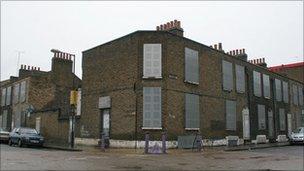Eric Pickles curbs councils' empty home seizure powers
- Published

Houses must be boarded up before they can be taken over under new laws
Councils will have to wait two years before seizing empty homes under plans by Communities Secretary Eric Pickles.
Under laws brought in by Labour to tackle housing shortages they can act after six months.
But Mr Pickles claims that was "heavy-handed" and infringed homeowners' rights - and that some councils were seizing homes without just cause.
Under his plans, properties will have to be boarded up and a proven magnet for vandals before being taken over.
He has also scrapped rules which allow homes on the property market to be seized if councils believe the asking price is "unrealistic" - and the powers will be limited to seizing properties that have attracted squatters or been targeted for vandalism and other forms of anti-social behaviour.
"There is a case for action to put boarded-up and blighted properties back into use," said Mr Pickles.
"But these draconian and heavy-handed state powers have allowed councils to seize private homes in perfect condition, including their fixtures and fittings, just because the homes have been empty for a short while."
In one case cited by Mr Pickles, a local authority threatened to use an Empty Dwelling Management Order against a woman who was caring for her elderly mother in France.
'Theoretical problems'
In another case, action was started against a divorced man who lived in a property at weekends when visiting his children. In a third case an order was issued against the house of a 96-year-old as soon as he died in a nursing home.
"People suffering the loss of a loved one should not have to endure the added indignity of having their home seized because of a delay in them deciding what to do with it," said Mr Pickles, who is changing the law on the issue through secondary legislation.
But a charity that campaigns for the use of empty homes said the examples quoted by Mr Pickles were "more theoretical problems than actual problems because, in each case, an order wasn't made".
David Ireland, chief executive of the Empty Homes Agency, said only 44 Empty Dwelling Management Orders had been made since the law had come into effect in 2006.
"It is disappointing. I would have expected it to be used more," said Mr Ireland, whose charity received funds from the previous Labour government to help tackle homelessness.
But he said the introduction of the orders had made councils think more seriously about using empty properties to solve housing shortages in parts of England.
'Vital tool'
And he was "pleased" that the coalition had decided not to scrap Empty Dwelling Management Orders altogether as some Conservatives had threatened when they were in opposition.
There were still about 750,000 empty homes in the UK, he added, and the powers could be used to seize control of "blocks of flats built speculatively but where none of the properties has been let" rather than run-down or vandalised properties.
Campbell Robb, chief executive of housing charity Shelter, also urged local authorities to use the legislation to bring properties back into use.
"With homelessness on the rise, millions priced out of the housing market and increasing numbers of people forced into an insecure private rented sector, tackling empty homes represents one small step in addressing our chronic lack of affordable housing.
"Local authorities must do all they can to bring long-term empty homes back into use, and the Empty Dwelling Management Order legislation provides them with a vital tool.
"However, this won't avert the need for a substantial increase in the number of new affordable homes we build to meet demand."